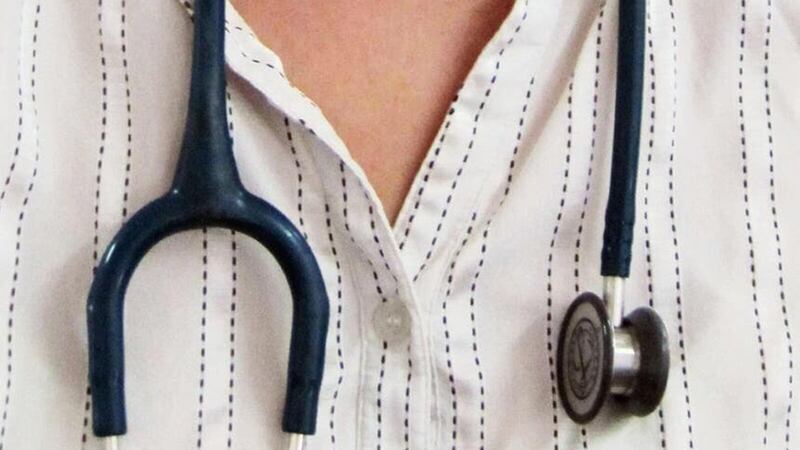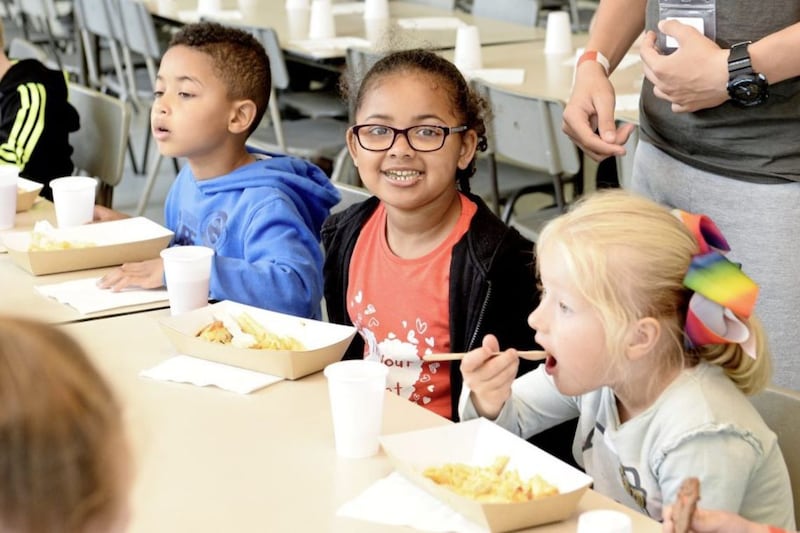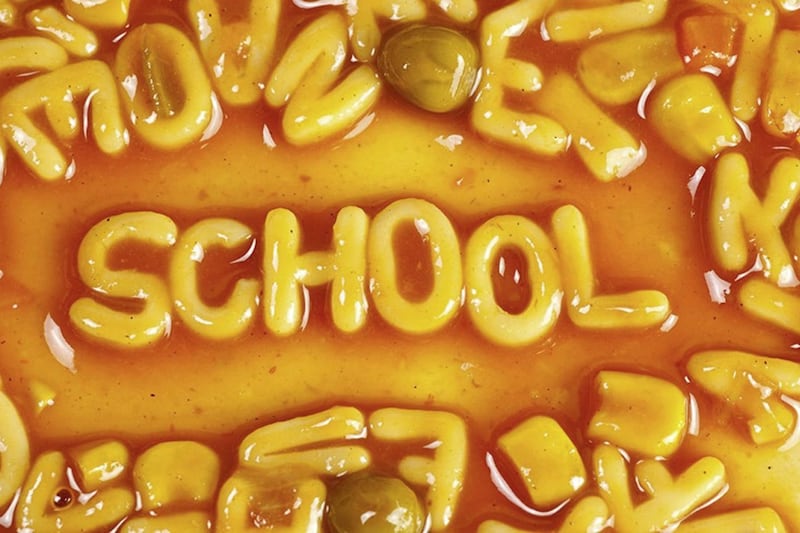TENS of thousands of meals are being provided free to children to tackle summer 'holiday hunger'.
Several schemes have been taking place across community centres and youth clubs.
Food poverty, especially during holidays, can be a significant issue for families on low incomes.
Close to 100,000 children in the north are entitled to free school meals during term – almost 30 per cent of all pupils.
These are provided to those whose parents receive benefits or whose family income is less than £16,190.
The premise behind free school meals is that children from low income households get a hot nutritional lunch. Some also avail of school breakfast clubs.
Families are concerned about being able to afford healthy food during summer.
They also say having the family at home increases their bills.
Summer holidays in the north are considerably longer than in other parts of the UK.
Numerous different initiatives have been running to tackle hunger during the school closure period.
Each also aims to improve mental health and wellbeing for young people.
Charities say providing support can improve nutrition during the summer and ensure there is no loss of educational memory.
Healthy Summer is a pilot programme supported by the Urban Villages Initiative and Business in the Community. It is providing more than 30,000 meals in areas with a history of deprivation and community tension.
It was inspired by an Urban Village community-led project tackling poverty in east Belfast.
Community groups highlighted the challenges caused when free school meals and breakfast clubs stopped during summer months.
They emphasised that parents, carers and other family members were also impacted by wider financial strains, which saw increased use of food banks.
Funding in excess of £50,000 is supporting the pilot.
This will help groups in Belfast and Derry address holiday hunger and deliver activities bringing young people and community together to improve wellbeing, learn new skills, promote good relations and have fun.
The hope is that the projects will help prevent children and their family members from going hungry but not feel stigmatised by accessing support.
A separate pilot, run by the Education Authority (EA), is taking place in Derry.
The EA Youth Service in partnership with voluntary youth providers in the city is piloting the Fuel for Fun programme.
It provides healthy lunches to children aged 4-11 participating in summer programmes being delivered by EA-managed youth centres.
"Evaluations of similar programmes have found that holiday food programmes reduced the risk of children going without food during the school holidays and helped lessen the worries parents and carers have about feeding their children during this period," an EA spokeswoman said.
"The programme aims to deliver over 23,000 lunches to 1,400 young people throughout July and August. The children and young people receiving a lunch will also participate in healthy eating workshops.
"The meals are prepared and delivered by a team of young people volunteering their time and effort through a local "generosity hub" located in local youth centres."
Sinn Féin education spokeswoman Karen Mullan said more than one quarter of children in the north were living in poverty.
"The summer holiday period will see up to 100,000 children missing out on their free school meal. Parents who rely on free school meals for their children are then faced with increased food bills and are often unable to cope," she said.
"The Trussell Trust food bank network is expecting this summer to be its busiest to date. School holidays place extra burdens on family budgets with the loss of free school meals adding between £30 and £40 per week to parents' outgoings for one child.
"The links between educational underachievement and deprivation are well known with children often weeks or months intellectually behind their better-off classmates who have a more wholesome diet during the holidays."
Ms Mullan has met government departments to stress "the reality and the urgency" of the issue.
She said many children's advocacy and rights groups were involved in "fantastic work". Programmes run by CiNI, Urban Villages and the EA, she said, would be evaluated at the end of the summer.
"When these projects are completed Sinn Féin will fully consider the outcomes achieved with a view to developing a model of tackling holiday hunger in partnership with the community and voluntary sector, government departments and the various children's rights and advocacy stakeholders," Ms Mullan said.
The hungriest time of the year
SUMMER can be the hungriest time of the year, a leading children's organisation has claimed.
Children in Northern Ireland (CiNI) says its mission is "no child should go hungry during school holidays".
The group has said it is disappointing that holiday provision for children on free school meals is not extended to the north.
More than £9 million is being invested in England.
It is campaigning to end holiday hunger in Northern Ireland by ensuring all children get the healthy food they need and deserve "every single day of the year".
CiNI has been running four holiday hunger projects this summer in Carrickfergus, Downpatrick, Portadown and Limavady, with funding from businesses.
Each will provide "food, fun and learning".
Its Portadown Gets Active scheme is one that provides a free nutritious breakfast and lunch and also gives children the opportunity to gain an OCN qualification in Healthy Living. There are other qualifications in peer mentoring and youth leadership.
Similar schemes run over Easter, Halloween and Christmas.
CiNI Policy Officer Ellen Finlay said it was a "sad fact" that thousands of children relied on healthy meals in school to provide adequate nutrition.
"During the holidays, these meals stop and families on low incomes can struggle to find the resources to provide enough food for their children," she said.
"The summer holiday in particular puts immense pressure on families and there is currently a holiday hunger crisis in Northern Ireland with thousands of children missing out on the main meals of the day or eating less nutritious food. Good nutrition is vital for the development of children and young people and those who do not receive it are at a disadvantage and that is unacceptable in this day and age. Parents are at breaking point with some of them going to bed hungry while they try their best to feed their children.
"As demand for our projects increase our budgets are stretched and this year, due to the current lack of government, finding funding is a particular problem. We are urging local businesses to provide vital financial contributions so that we can help as many children across Northern Ireland and ultimately achieve our end goal of ending holiday hunger."
50,000 children offered free meals and activities in England this summer
AROUND 50,000 disadvantaged children in England have been offered free meals and activities over the summer holidays, funded by £9.1 million from the Department for Education.
The scheme followed a successful £2m programme in the summer of 2018, which saw charities and community groups provide meals and activities such as football, play sessions and cooking classes for more than 18,000 children.
To build on that, ministers more than quadrupled the funding ahead of summer 2019 so that even more disadvantaged children can benefit.
This year, about 50,000 disadvantaged children in 11 local authority areas have benefited.
Charities including Barnardo's and the Happy Healthy Holidays consortium are assisting.
The House of Commons heard calls from Sharon Hodgson, MP for Washington and Sunderland West, to extend the scheme.
She told former Prime Minister Theresa May she had an opportunity to leave a "meaningful, lasting legacy".
Mrs May said, however, that while more money was being made available, just 11 areas would benefit.
They include Bradford, Croydon and Newcastle.
"We had a successful £2 million programme in the summer of 2018, and this year we are more than quadrupling this funding," Mrs May said.
"About 50,000 disadvantaged children in 11 local authority areas will be offered free meals and activities over the summer holidays. That is going to be funded by £9 million from the Department for Education. We had a good programme last year, and we are expanding that programme this year because we want to help children, wherever they are, receive the right support in school and out."





